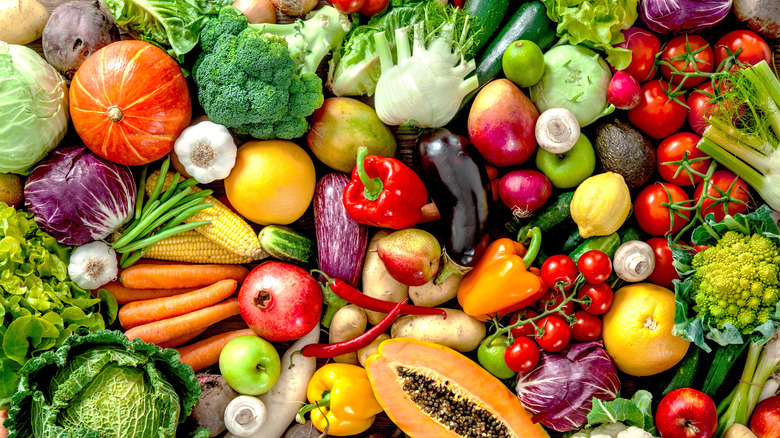
Plant Based Diet And Gas, How Can They Affect Your Health?
plant-based diet
Key Takeaways
- According to specific studies, eating a diet higher in plant based fiber can affect gas production in the digestive tract.
- The researchers believe that even though this outcome may be unsettling, it should be seen as a sign of improved health.
- The experts emphasize that there are ways to lessen the severity of this impact, one of which is by gradually increasing the amount of fiber consumed.
It is conceivable that you are noticing an increase in digestive alterations because you have recently moved to a plant based diet that incorporates a more significant number of whole grains, fruits, and vegetables.
New research published in the journal Nutrients reveals that experiencing flatulence when following this diet plan is not only ordinary but also a good indicator that one's health is improving. In point of fact, having more plant material in the digestive tract may cause increased flatulence.
Concerning The Research
plant-based diet
The researchers enlisted the help of 18 adult male volunteers in good health. For two weeks, the volunteers followed a Western-style diet heavy in processed carbohydrates and low in fiber. For the remaining two weeks, the volunteers followed a plant based Mediterranean diet. Randomization was used to determine the sequence of the specialized diets. To guarantee that the participants' intestines were in the same state at the beginning of each research period, each specialized diet was preceded by a two-week period in which they followed a balanced "washout" diet.
The individuals' stool content, as well as the frequency of their bowel movements, were evaluated before, during, and after the research periods. In addition to that, they determined the frequency of flatulence. Following the plant based weeks, the individuals did not see an increase in the frequency of their bowel movements; nevertheless, the size of their stools doubled. They also have much more episodes of flatulence throughout the day as well as a greater quantity of gas after meals.
The researchers concluded that the gassy result was caused by a considerable increase in the proliferation of helpful bacteria and more plant material in the digestive tract, even though the gassy consequence can be painful. For the bacteria to digest those meals, fermentation has to occur, resulting in the production of gas as a byproduct.
The Significance Of Fiber
Healthy Food
Although the latest study has severe limitations due to the tiny participant population, earlier research has revealed that diets high in fiber might have substantial benefits on the health of the gastrointestinal tract.
For instance, a recent study is published in the journal mSystems found favorable changes in the digestive system's microbiome after only two weeks of following a diet that emphasized vegetables, fruits, and whole grains.
In that particular study, the individuals consumed around 40 to 50 grams of fiber per day, which is a significantly more considerable amount than the Food and Drug Administration's (FDA) current guideline of 28 grams of fiber per day.
According to Katrine Whiteson, Ph.D., associate professor of molecular biology and biochemistry at the University of California Irvine, the daily consumption of fiber among the general population in the United States is only about 15 grams on average2, and this number has been steadily declining over the course of the last century.
healthy food
According to her, the absence of fiber in the diets of people in industrialized countries is starving the microorganisms that live in our guts, which significantly negatively affects our health.
Not only may this affect digestive function, but it has also been proven that enhanced gut health reduces the incidence of colorectal cancer, improves the immune function response, and lowers the prevalence of autoimmune diseases. Additionally, it can improve one's mood, alleviate the symptoms of depression, and reduce inflammation throughout the body.
Dr. Whiteson highlights the need to raise the total quantity of fiber but also notes that having a diverse range of plant species is essential. According to a research review published in the journal Molecular Metabolism, a healthy microbiome depends on a wide variety of distinct strains of beneficial bacteria.
In point of fact, eating a wide variety of foods will result in a microbiome that is rich in variety. The advantage of this, according to the researchers, is that bacteria will be more flexible and less likely to be disrupted, both of which can lead to undesirable results for one's health.
Maintaining A Steady Pace
plant-based diet
One of the most interesting of the most recent research was that individuals with a significant degree of diversity in the bacteria that lived in their guts saw less of an increase in the amount of flatulence they experienced.
This suggests that the gassy impact is probably merely a temporary adjustment to higher-fiber diets.
It is probable that the short length of time allowed for the transfer from the default diet to the high-fiber diet resulted in a more dramatic effect in terms of gassy outcomes since there was no adjustment period. This hypothesis is supported by the gassy results being more severe.
According to dietitian Tamara Duker Freuman, RD, who specializes in the dietary management of digestive and metabolic diseases and is the author of The Bloated Belly Whisperer, this is a common issue with people who switch to more fiber abruptly. Freeman is the author of the book “The Bloated Belly Whisperer.”
According to Freuman, "when you add a lot of healthy alternatives to your diet—especially with fiber—it might cause digestive difficulties if you attempt to do too much, too soon." If you try to do too much too soon, it can cause digestive troubles.
plant-based diet
This may result in increased gas production, discomfort, bloating, and, in more challenging situations, stomach cramps, and diarrhea. She thinks that a more effective tactic would be to gradually increase the consumption of these meals over the course of several weeks or even months. It is especially essential to exercise extreme caution when it comes to "nutritious" manufactured food alternatives such as bean pasta, cauliflower crusts, and nut flours.
She notes that people tend to forget to consider them when analyzing the amount of fiber they consume. However, depending on how much of it you consume on a daily basis, the effects may be significant.
Even if a new study shows that flatulence may be a sign that your gut health is going back on track, you shouldn't put up with it just because of that. According to Freuman, when the gas gets unpleasant, you may need to slow down your transition to a diet higher in fiber so that your body has more time to acclimatize to the change.
What All Of This Indicates About You
plant-based diet
A shift toward a diet that is more plant based can be healthy for your digestive tract, but it also comes with the risk of increased gas and other side effects. Instead, go about it slowly and steadily so your body can become used to the increased fiber intake. In addition, if you find that your flatulence is causing you significant discomfort, you should discuss your issues with a medical professional.










